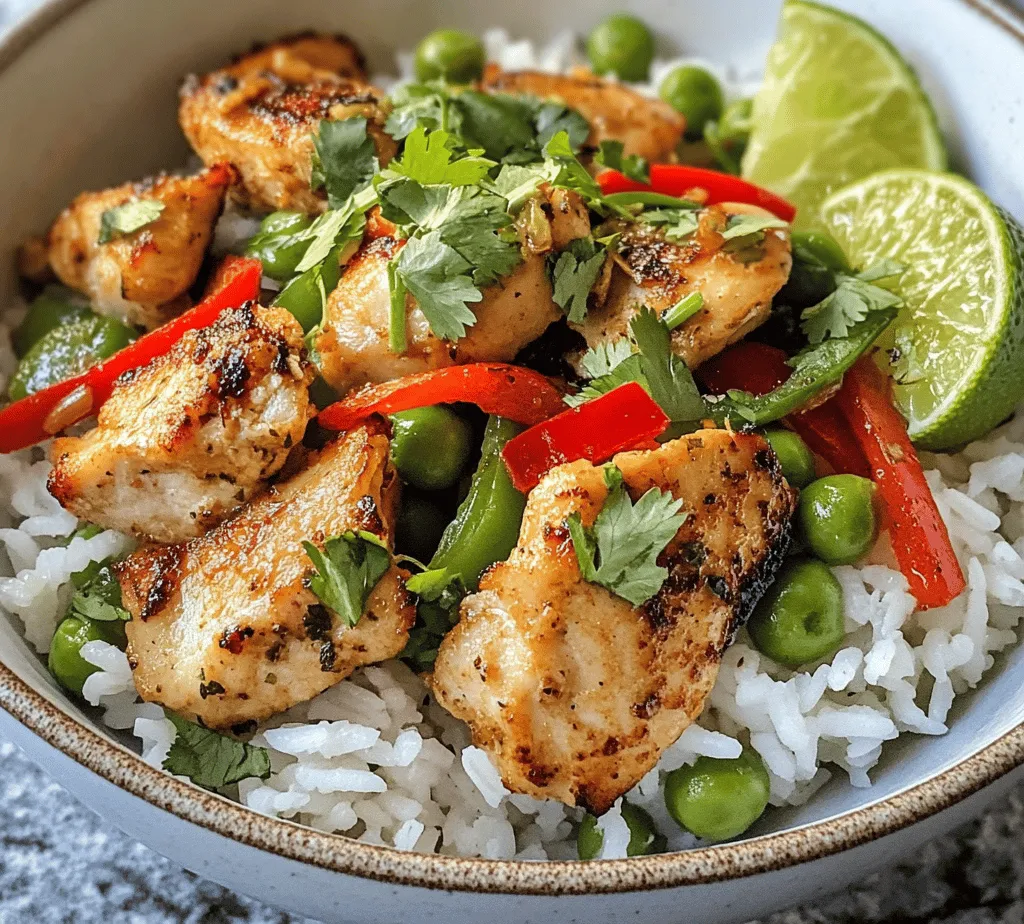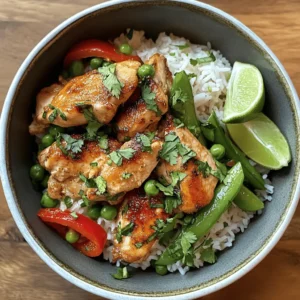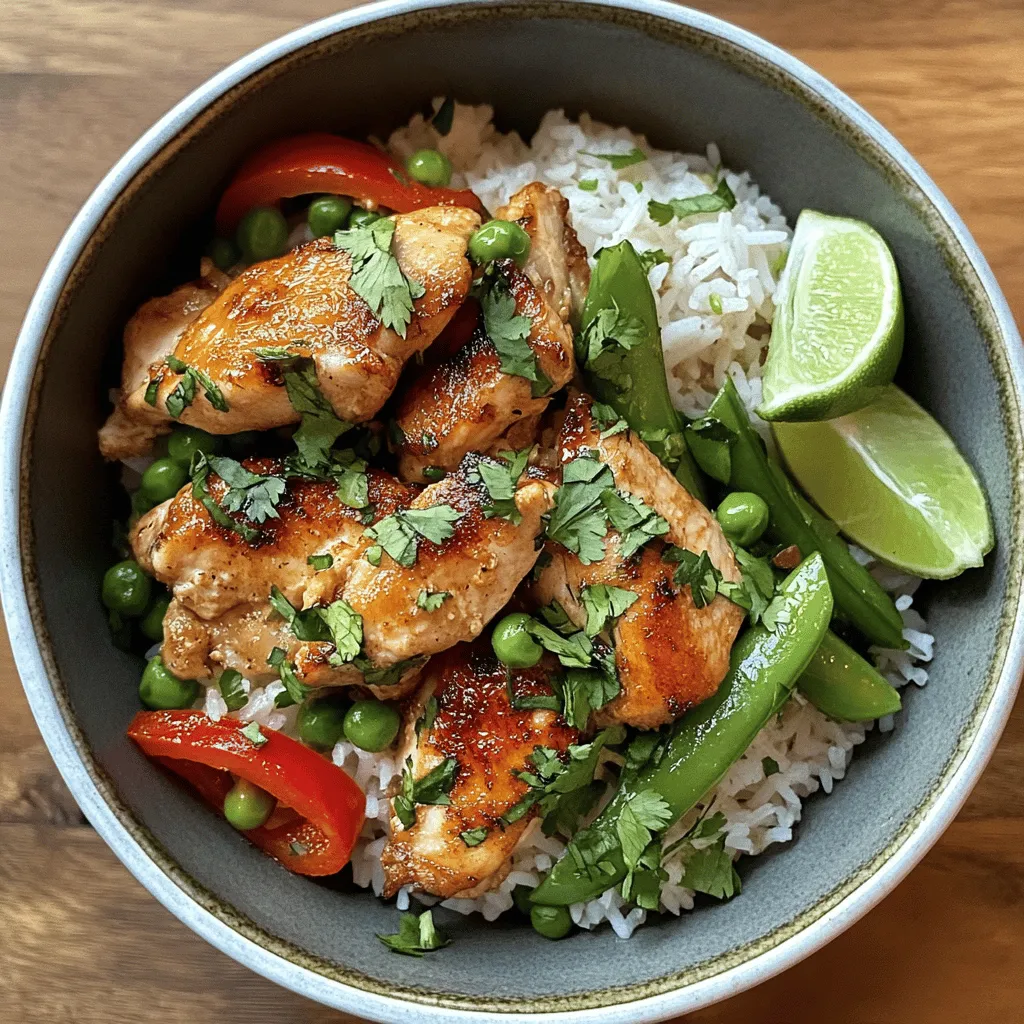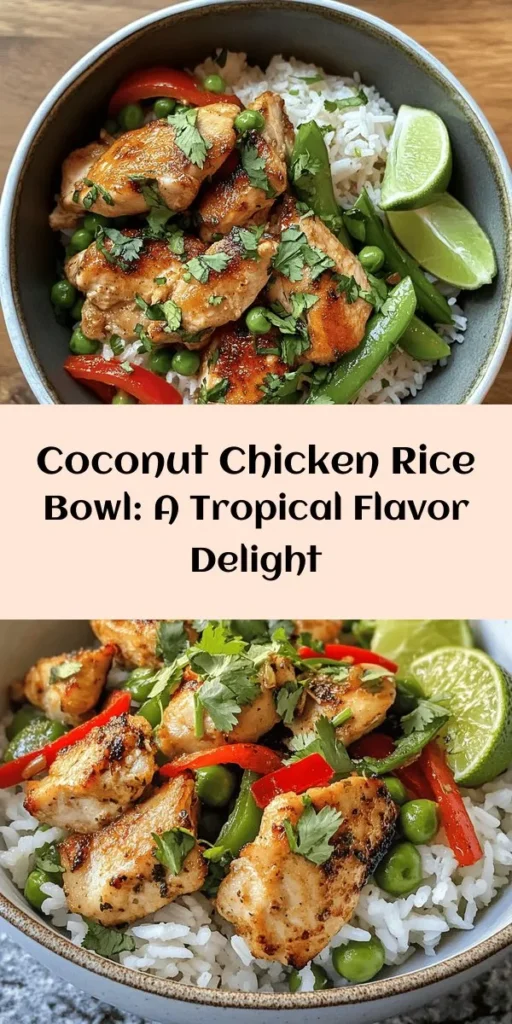When it comes to comfort food, few dishes can compete with the delightful combination of flavors and textures found in a Coconut Chicken Rice Bowl. This dish is not only a feast for the senses but also a nourishing meal that brings together the rich, creamy goodness of coconut milk, the fragrant aroma of jasmine rice, and tender, juicy chicken thighs. Whether you’re looking for a quick weeknight dinner or an appealing meal prep option, this recipe checks all the boxes.
At its core, the Coconut Chicken Rice Bowl is a harmonious blend of protein, vegetables, and carbohydrates that creates a satisfying and wholesome meal. The allure of this dish lies in its versatility—it’s easy to customize by adding your favorite vegetables or adjusting the level of spice to suit your taste. This recipe is all about celebrating the unique flavors of coconut and jasmine rice, which elevate the dish to a new level.
Understanding the Ingredients
To truly appreciate the Coconut Chicken Rice Bowl, it’s essential to understand the star ingredients that bring it to life. Each component serves a purpose, enhancing the overall flavor profile and nutritional value of the dish.
Jasmine Rice
Jasmine rice is the foundation of this delectable bowl, known for its long grains and fragrant aroma. Originating from Thailand, jasmine rice has a subtle floral scent and a slightly sticky texture when cooked, making it an ideal canvas for absorbing flavors.
Characteristics and Flavor Profile
Jasmine rice is often characterized by its slightly nutty taste and delicate, soft mouthfeel. When prepared correctly, it complements the rich coconut milk beautifully, creating a creamy base that contrasts nicely with the savory chicken and crisp vegetables.
Benefits of Using Jasmine Rice in Recipes
In addition to its delightful flavor, jasmine rice is a great source of carbohydrates, providing the energy needed for a busy day. Its unique texture allows it to hold up well in various dishes, making it a favorite among home cooks and chefs alike. Plus, it cooks relatively quickly, making it a perfect choice for weeknight meals.
The Role of Coconut Milk
Coconut milk is another key player in the Coconut Chicken Rice Bowl, bringing a luscious creaminess that transforms the rice and elevates the dish’s overall flavor.
Nutritional Benefits of Coconut Milk
Rich in healthy fats, particularly medium-chain triglycerides (MCTs), coconut milk offers several health benefits, including improved heart health and increased energy levels. Additionally, it is lactose-free, making it an excellent alternative for those with dairy sensitivities.
How It Enhances Flavor and Texture in the Dish
The creamy texture of coconut milk enriches the rice, allowing it to absorb all the wonderful flavors from the spices and seasonings. As the rice cooks, the coconut milk adds a subtle sweetness that balances the savory notes from the chicken and vegetables, creating a well-rounded flavor profile that is both comforting and satisfying.
Overview of Chicken Thighs
While many recipes call for chicken breasts, this Coconut Chicken Rice Bowl opts for chicken thighs, which offer juiciness and flavor that can’t be beaten.
Why Chicken Thighs Are Preferred Over Breasts for This Recipe
Chicken thighs are known for their higher fat content compared to chicken breasts, which helps keep the meat tender and moist during cooking. This is especially important in a dish like this, where the chicken is sautéed and then combined with the creamy rice.
Importance of Marinating and Seasoning Chicken
To maximize flavor, marinating the chicken thighs is essential. A simple marinade of coconut milk, soy sauce, and spices infuses the meat with a delicious depth of flavor, ensuring each bite is bursting with taste. Proper seasoning not only enhances the chicken itself but also complements the other ingredients in the bowl.
Fresh Vegetables in the Dish
Fresh vegetables play a significant role in the Coconut Chicken Rice Bowl, adding color, crunch, and essential nutrients.
Health Benefits of Red Bell Peppers and Snap Peas
Red bell peppers are rich in vitamins A and C, providing antioxidants that support overall health. Their sweet flavor pairs perfectly with the savory elements of the dish. Similarly, snap peas contribute a delightful crunch and are an excellent source of fiber, which aids digestion and promotes satiety.
How Vegetables Add Color and Flavor to the Bowl
Incorporating a variety of vegetables not only enhances the visual appeal of the Coconut Chicken Rice Bowl but also adds layers of flavor and texture. The vibrant colors of the red bell peppers and snap peas create an inviting presentation that makes the dish even more appetizing.
Preparation Steps for Coconut Chicken Rice Bowl
Creating a Coconut Chicken Rice Bowl is a straightforward process that involves a few essential steps. Here’s how to prepare this delicious meal from start to finish.
Cooking the Rice
The first step in making your Coconut Chicken Rice Bowl is to cook the jasmine rice. Follow these simple instructions for perfectly fluffy rice every time.
1. Rinse the Rice: Begin by measuring out the desired amount of jasmine rice. Rinse the rice under cold water in a fine-mesh strainer until the water runs clear. This step removes excess starch, preventing the rice from becoming overly sticky.
2. Cook the Rice: In a medium saucepan, combine the rinsed rice with water and a can of coconut milk. The ratio typically is one cup of rice to one and a half cups of liquid, but refer to the instructions on your rice package for specifics. Bring the mixture to a boil, then reduce the heat to low and cover the pot. Allow the rice to simmer for about 15-20 minutes or until the liquid is absorbed and the rice is tender.
3. Fluff the Rice: Once cooked, remove the saucepan from the heat and let it sit, covered, for an additional 5 minutes. Afterward, fluff the rice with a fork. The coconut milk will give the rice a creamy texture that perfectly complements the other ingredients in the dish.
Sautéing the Chicken
Next, it’s time to prepare the chicken thighs. A perfect sear on the chicken not only enhances its flavor but also adds an appealing texture.
1. Marinate the Chicken: In a bowl, combine the chicken thighs with a marinade of coconut milk, soy sauce, garlic, ginger, and your choice of spices. Allow the chicken to marinate for at least 30 minutes, or up to overnight in the refrigerator for maximum flavor.
2. Heat the Pan: In a large skillet or frying pan, heat a tablespoon of oil over medium-high heat. Once the oil is shimmering, it’s time to add the marinated chicken thighs.
3. Achieve the Perfect Sear: Cook the chicken for about 6-7 minutes on each side, or until the internal temperature reaches 165°F (75°C). A good sear will create a golden-brown crust that locks in moisture and flavor.
Incorporating Aromatics and Vegetables
To add depth to your Coconut Chicken Rice Bowl, it’s time to incorporate fresh vegetables and aromatics.
1. Sauté Aromatics: After removing the chicken from the pan, add chopped garlic, ginger, and sliced red bell peppers to the same skillet. Sauté for 2-3 minutes until fragrant and the vegetables begin to soften.
2. Add Snap Peas: Toss in the snap peas and continue to sauté for another 2 minutes, just until they are bright green and tender-crisp. This quick cooking method preserves their nutrients and vibrant color.
As you combine all these ingredients, you will create a beautifully balanced and flavorful Coconut Chicken Rice Bowl that is sure to impress. Stay tuned for the following sections where we will delve deeper into serving suggestions, variations, and tips for creating the perfect bowl every time.

Cooking is an art, and when it comes to creating a delicious Coconut Chicken Rice Bowl, the nuances of flavor and presentation play a pivotal role. The integration of garlic and ginger not only enhances the dish’s flavor profile but also adds nutritional benefits, making each bite a delightful experience.
The Role of Garlic and Ginger in Enhancing Flavor
Garlic and ginger are two powerhouse ingredients that can elevate any dish, and they are particularly essential in a Coconut Chicken Rice Bowl. Garlic provides a robust, savory flavor, while ginger adds a subtle warmth and spiciness that balances the richness of the coconut milk. To maximize their flavor, opt for fresh garlic and ginger instead of powdered versions. Mince them finely to ensure they release their oils and flavors effectively when cooked.
When sautéing garlic and ginger, it’s important to add them at the right time in the cooking process. Start by heating your oil and then add the garlic first, allowing it to become fragrant (about 30 seconds) before introducing the ginger. This technique prevents the garlic from burning, which can lead to a bitter taste. The result is a fragrant base that enhances the chicken and vegetables beautifully.
Techniques for Properly Cooking Vegetables to Maintain Crispness
Achieving the perfect texture for your vegetables is vital in a Coconut Chicken Rice Bowl. Aim for a balance between tender and crisp, ensuring they retain their vibrant color and nutrients. Begin by selecting fresh vegetables like bell peppers, snap peas, and carrots. To maintain crispness, consider the following techniques:
1. Blanching: Briefly boil the vegetables for a couple of minutes, then immediately transfer them to an ice bath. This method locks in their color and crunch.
2. Stir-frying: Keep the heat high and cook the vegetables quickly, stirring continuously. This method preserves their texture and flavor.
3. Timing: Add heartier vegetables (like carrots) first, as they take longer to cook, followed by quicker-cooking ones (like bell peppers) to ensure everything is perfectly tender yet crisp.
Assembling the Bowl
Once the chicken and vegetables are cooked to perfection, it’s time to assemble your Coconut Chicken Rice Bowl. Start with a generous portion of rice as your base. Using a measuring cup can help with portioning, ensuring everyone gets the same amount. Next, spoon the coconut chicken mixture over the rice, followed by a colorful array of cooked vegetables.
For visual appeal, layer the ingredients rather than simply mixing them. This creates a beautiful presentation that showcases the vibrant colors of the vegetables and the creamy coconut chicken. You can even create a small well in the rice to hold the chicken and sauce, making the dish look even more enticing.
Tips for Portioning Rice and Chicken Mixture
When preparing the Coconut Chicken Rice Bowl, portion control is key to a balanced meal. A standard serving size for rice is about one cup cooked, which provides a satisfying base without overwhelming the dish. For the chicken mixture, aim for about 4-6 ounces per serving, depending on individual protein needs.
To make portioning easier, consider using a food scale or measuring cup during preparation. This not only helps in maintaining consistency but also aids in tracking nutritional information for those mindful of their intake.
Suggestions for Layering Ingredients for Visual Appeal
Creating a visually stunning Coconut Chicken Rice Bowl involves thoughtful layering of ingredients. Start with the rice, as it provides a neutral backdrop. Next, add the chicken mixture, followed by a colorful array of vegetables. To take it a step further, you can:
– Add Contrast: Use a variety of colors. Bright green snap peas, red bell peppers, and orange carrots not only enhance flavor but also make the dish visually appealing.
– Create Height: Layer the chicken and vegetables in a way that adds height to the bowl. This can be achieved by stacking the ingredients or placing them slightly off-center.
– Garnish: Finish with fresh herbs, lime wedges, or a sprinkle of chili flakes to draw the eye and add an extra pop of flavor.
Serving Suggestions
Garnishing the Dish
Garnishing is the final touch that can elevate your Coconut Chicken Rice Bowl from simple to spectacular. Fresh herbs like cilantro, basil, or mint add freshness and a burst of flavor. A wedge of lime not only adds a zesty finish but also invites diners to squeeze fresh juice over the dish, enhancing the overall taste.
The Importance of Fresh Herbs and Lime for Flavor Enhancement
Fresh herbs are vital in balancing the richness of the coconut milk and chicken. They provide a refreshing contrast that brightens the dish. Lime juice, on the other hand, adds acidity, cutting through the creaminess and bringing all the flavors together. Encourage your guests to customize their bowls with as much or as little lime as they prefer.
Using Chili for an Extra Kick: When and How to Add
If you enjoy a bit of heat, consider incorporating fresh chili peppers or chili flakes into your Coconut Chicken Rice Bowl. You can add sliced chili peppers during cooking for a milder infusion of heat, or sprinkle chili flakes as a garnish for those who prefer a bit more spice. Adding chili not only elevates the flavor profile but also provides a delightful contrast to the creamy coconut sauce.
Pairing Options
To round out your meal, consider some delicious side dishes that complement the Coconut Chicken Rice Bowl:
– Cucumber Salad: A refreshing cucumber salad with a light vinaigrette can provide a crisp contrast to the warm bowl.
– Spring Rolls: Fresh spring rolls filled with vegetables and herbs can add a crunchy texture and vibrant flavors.
– Mango Salsa: A sweet and spicy mango salsa can enhance the tropical flavors of the dish.
Beverage Pairings to Enhance the Dining Experience
Selecting the right beverage can elevate your meal. For a non-alcoholic option, consider coconut water or a refreshing herbal iced tea. If you prefer something with a kick, a light beer or a fruity cocktail pairs wonderfully with the tropical elements of this dish.
Nutritional Information
Breakdown of Calories, Protein, Fats, and Carbs per Serving
One serving of the Coconut Chicken Rice Bowl typically contains around 450-550 calories, depending on the specific ingredients and portion sizes used. The approximate breakdown is:
– Protein: 25-30g
– Fats: 15-20g (largely from the coconut milk and chicken)
– Carbohydrates: 50-60g (primarily from the rice and vegetables)
Discussion of Health Benefits Associated with the Ingredients
The ingredients in the Coconut Chicken Rice Bowl offer a variety of health benefits. Chicken is a great source of lean protein, supporting muscle growth and repair, while coconut milk provides healthy fats that can aid in nutrient absorption. The colorful array of vegetables contributes essential vitamins, minerals, and antioxidants, promoting overall health.
How This Dish Fits into Various Dietary Preferences
This Coconut Chicken Rice Bowl can easily fit into various dietary preferences. It is naturally gluten-free, making it suitable for those with gluten sensitivities. Additionally, it can be modified to accommodate dairy-free diets if you ensure that the coconut milk is your sole source of creaminess.
Coconut Chicken Rice Bowl Variations
Vegetarian Adaptations
For a vegetarian version of the Coconut Chicken Rice Bowl, consider substituting chicken with tofu or tempeh. Both options absorb flavors well and provide a similar texture when cooked properly. Marinade the tofu or tempeh in the same coconut sauce before cooking to ensure it is flavorful throughout.
Suggestions for Substituting Chicken with Tofu or Tempeh
When using tofu, opt for firm or extra-firm varieties. Press it to remove excess moisture before marinating and sautéing. Tempeh, with its nutty flavor, can be crumbled or sliced, marinated, and then sautéed for a delightful texture.
Adjustments to Maintain Flavor and Texture
To maintain the rich flavors when using tofu or tempeh, ensure you season well and allow ample time for marination. Cooking techniques such as frying or grilling can also enhance the texture and add a nice char that mimics the grilled chicken.
Different Spice Profiles
To diversify your Coconut Chicken Rice Bowl, you can explore different spice profiles. Consider adding curry powder or garam masala for an Indian twist or incorporating Thai red curry paste for a spicier, more aromatic dish. Experimenting with these variations allows you to customize the bowl according to your taste preferences.
Exploring How to Incorporate Different Spices or Sauces for Varied Flavor
Using different sauces can also impart unique flavors. For example, teriyaki sauce can provide a sweeter, umami-rich profile, while a spicy sriracha sauce can add a bold kick. Feel free to mix and match spices and sauces to create a bowl that resonates with your palate.
Conclusion
The Coconut Chicken Rice Bowl is a versatile and nutritious meal option that can be adapted to suit various tastes and dietary needs. Its combination of flavors and textures makes it a satisfying dish that can be enjoyed by everyone. Cooking and sharing meals is a fulfilling experience, and this recipe encourages creativity in the kitchen.
As you prepare your Coconut Chicken Rice Bowl, remember that the joy of cooking lies in experimentation. Don’t hesitate to play with flavors, adjust ingredients, and make this dish your own. Whether you’re enjoying it with family, friends, or simply treating yourself, this recipe is sure to become a go-to favorite in your culinary repertoire.



